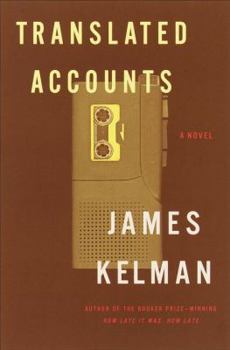Translated Accounts
Select Format
Select Condition 
Book Overview
In Translated Accounts , the Booker Prize-winning author of How late it was, how late , offers us a harrowing glimpse into a realm where power is unchecked and liberties are few or nonexistent. Taking... This description may be from another edition of this product.
Format:Hardcover
Language:English
ISBN:0385495811
ISBN13:9780385495813
Release Date:October 2001
Publisher:Doubleday Books
Length:322 Pages
Weight:0.80 lbs.
Dimensions:1.3" x 6.0" x 8.5"
Customer Reviews
2 ratings
4 stars
Published by Thriftbooks.com User , 22 years ago
James Kelman won the Booker Prize for his novel "How Late It Was, How Late" a good few years ago now, but in the time since then he has produced superior work such as "The Good Times" and "Translated Accounts". This book is a series of narratives written/spoken/emailed by people (of uncertain geographical location) whose right to free speech has been denied to the extent that sometimes it is only by attempting a decoding of the censor's voice that anything can be understood.The narratives are sometimes romantic, sometimes banal, and occasionally horrific. But because the language is garbled by translation or censorship, the images thrown up are general rather than specific. There is no doubt that the author knows a lot about the former Yugoslavia, but such reference points aren't really useful since the book is more concerned with this kaleidoscope of individual experiences, rather than shaking a leftist fist at governments. In ways this book is a first. It's not the everything's-under-the-surface dream world of Joyce's "Finnegans Wake". It's not the inner-city Glasgow of "How Late". Neither poetry nor prose. What it is is the glacial hardness of the human spirit under a strain so great that sense itself is broken.
Not Since Beckett Has There Been Such A Book
Published by Thriftbooks.com User , 23 years ago
There's so many books out there, and so many good ones (thankfully), so it's hard to explain exactly why, after reading this one, I felt I'd read something truly important. Language forms the deep centre of this novel, the story of an un-named country under what seems to be a kind of stark martial law. The whole book is written in a kind of elegantly broken English. These are the stories of a non-English country forced into English with little regard for the identities of the people or the importance of either language. You see how hard it is to explain? After all that has happened recently, the fibre of this story feels desperately necessary. The human stuff that is so difficult to parse within this novel (due to the faulty translations--the really incredible style developed by Kelman, it's just amazing, really), is the struggle we're now all facing to find the right language to describe our horrors. This book will immediately remind you of certain books by Nobel prize winning guy Samuel Beckett. It's not as heavy a read as say, The Unnamable, which is good. It's sort of like Beckett's later fictions, but instead of completely vanishing down the endless hole of despair and (let's face it) nonsense, Kelman is telling a fascinating story.If when you read you don't like your time wasted on tripe, vacuousness, bull, sloppiness, hackwork, guile, smoke & /or mirrors, etc. then certainly this is a book worth reading. The essential truth here, is that like Faulkner, like Joyce, like Beckett, like Pynchon, like Bellow, this is a book for history. The deep history of great reading.






